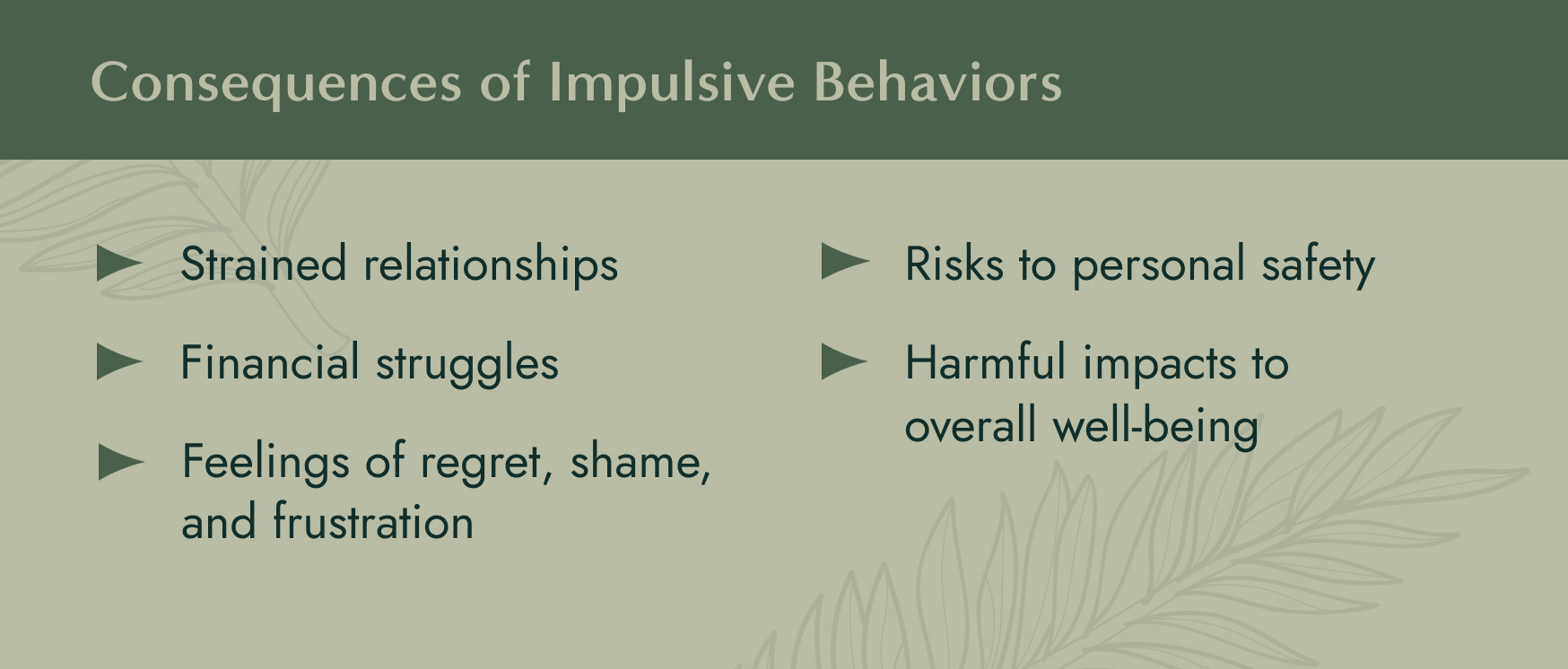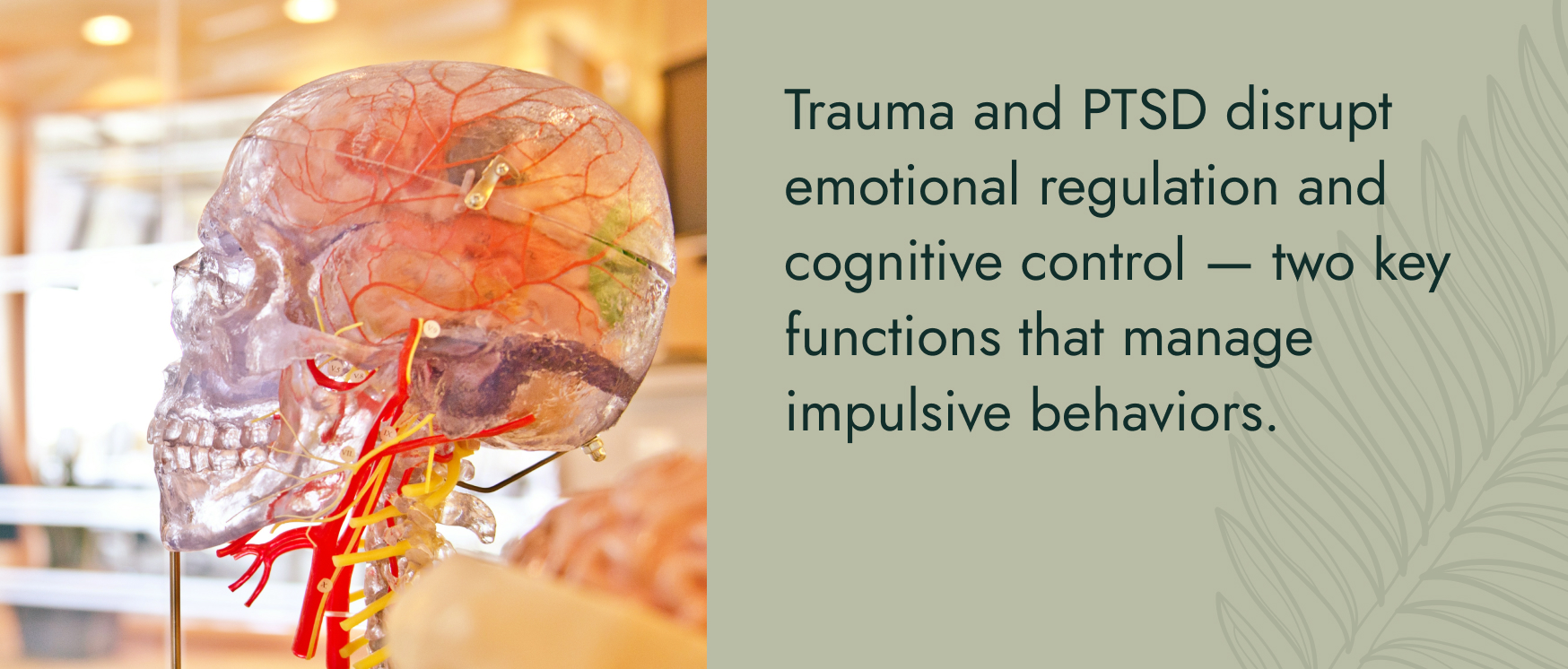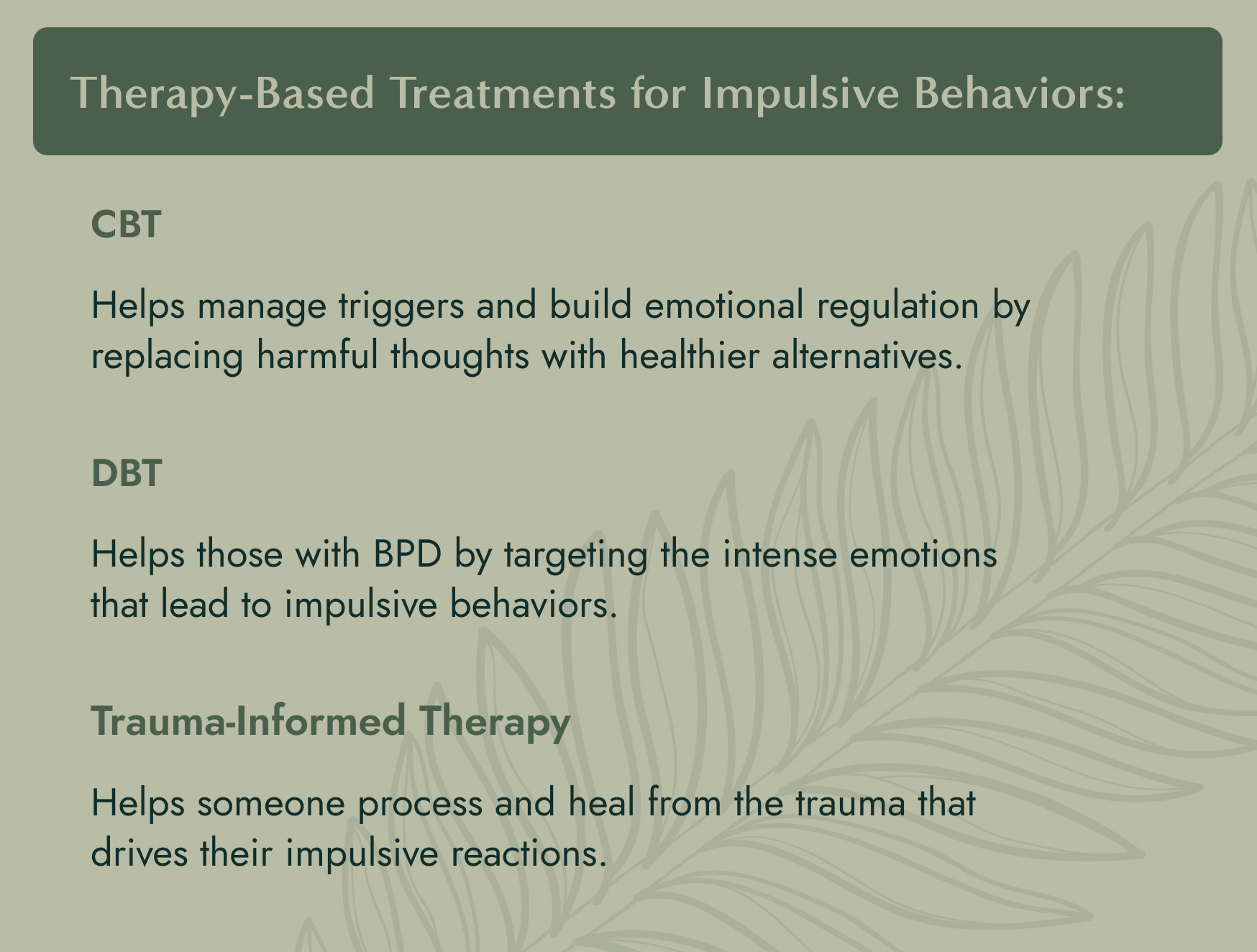How to Control Impulsive Behaviors


Impulsivity can feel like a sudden, uncontrollable urge to do something, even if it results in negative consequences. Sometimes, impulsive behaviors can feel impossible to control, like your actions are happening faster than your brain can process them.
To figure out why we sometimes act first and think later, let’s take a look at what impulsive behaviors are, where they come from, and how to control them.
What Are Impulsive Behaviors?
Impulsive behavior refers to acting on sudden urges without fully thinking through the consequences. This happens when the brain struggles to control these urges, making it hard to stop and think before acting.
Impulsive behaviors come in many different forms, including:
- Uncontrollable spending
- Aggressive or violent behavior
- Interrupting others
- Being easily distracted
- Binge eating
- Reckless activities
These behaviors often result in negative consequences that affect relationships, finances, personal safety, and someone’s overall well-being. As a result, they often lead to intense feelings of regret, shame, and frustration.

Get to the Bottom of Your Impulsive Behaviors
No matter what leads to your impulsive behaviors, Sequoia Behavioral Health can help. We can give you the tools to control your behavior while treating the root of your mental health struggles. Learn about how to get started today.

What Causes Impulsive Behaviors?
Impulsive behaviors are usually linked to differences or impairments in specific regions of the brain. In some cases, they may result from physical brain damage, while in others, they stem from certain mental health disorders.
Some of the mental health conditions that are associated with impulsive behaviors include:
- Attention-deficit/hyperactivity disorder (ADHD)
- Borderline personality disorder (BPD)
- Bipolar disorder
- Substance use disorders (SUD)
- Eating disorders
Impulsivity is also commonly found in those who suffer from childhood trauma (CT) and posttraumatic stress disorder (PTSD). In fact, a study published by the National Institutes of Health revealed unique patterns of relationships that exist between CT, PTSD symptoms, and impulsivity.
How Does Childhood Trauma Cause Impulsive Behaviors?
CT disrupts the brain’s ability to develop emotional regulation and cognitive control, which are two key functions needed to manage and control impulsive behaviors. CT can also lead to PTSD, which further impairs these functions by heightening emotional reactivity and reducing the capacity to tolerate stress.
As a result, those who have a history of childhood trauma are more likely to have difficulty controlling impulsive behaviors. This is especially true if they also suffer from PTSD symptoms, which can intensify emotions and make it even harder to pause and reflect before acting.

What Part of the Brain Controls Impulsive Behaviors?
Although there are several regions in the brain that play a part in managing impulses, the prefrontal cortex is the primary region that controls impulsive behaviors.
The prefrontal cortex is located in the frontal lobe, and it is responsible for executive functions such as:
- Decision-making
- Impulse control
- Planning
- Social behavior
- Emotional regulation
When the prefrontal cortex becomes damaged, disrupted, or impaired, it can reduce someone’s ability to manage impulses. This can happen in a number of ways, including trauma, physical damage, mental health disorders, brain disorders, and substance use.
How to Stop Impulsive Behaviors—Strategies, Therapies, and Medications
Many impulsive behaviors start as impulsive thoughts that urge someone to take action. Although you can’t stop these thoughts from popping into your head, you can limit the impact they have on you by practicing mindfulness and self-awareness.
Mindfulness techniques, like meditation and deep breathing exercises, help by grounding you in the moment and allowing you to notice your thoughts and feelings. This not only reduces the intensity of impulsive thoughts, but it also gives you greater control over how you want to act on them.
Practicing self-awareness can help you identify the people, situations, and emotions that trigger your impulsive behaviors. This allows you to develop healthier coping strategies for managing your triggers, like changing your environment, avoiding high-risk situations, or practicing mindfulness strategies when a trigger can’t be avoided.

Therapy-Based Treatments for Impulsive Behaviors
Certain therapies, like cognitive behavioral therapy (CBT), can be particularly effective at helping someone manage their impulsive thoughts and behaviors.
CBT works by connecting someone’s thoughts to their emotions and behaviors. Once someone has identified the thoughts that eventually lead to impulsive behaviors, they can then replace these thoughts with healthier, rational alternatives. As a result, CBT helps someone manage triggers, develop emotional regulation, and behave as they intend to.
In addition to CBT, there are many other therapy-based treatments that can help manage the impulsive thoughts that are linked to a specific mental health condition. For example, dialectical behavior therapy (DBT) helps those with BPD by targeting the intense emotions that lead to impulsive behaviors, and trauma-informed therapy helps someone process and heal from the trauma that drives their impulsive reactions.

At Sequoia Behavioral Health, our trauma-focused therapies place a special emphasis on understanding and resolving trauma at its root.
Related Blogs

Signs of Unresolved Childhood Trauma
Unresolved childhood trauma manifests in many different ways. Discover the physical, behavioral, and psychological signs of unresolved trauma.

What are the Signs of Repressed Trauma?
Repressed trauma can have lingering effects on your physical and mental health. Discover the signs of repressed trauma and how it can be treated.

Mood Stabilizer Medications
Mood stabilizers can be very helpful for many people. Learn about how they work and what they’re most prescribed for.
Medications for Managing Impulsive Behaviors
Certain medications may also be prescribed alongside therapy to help reduce the urge to engage in impulsive behaviors. These medications can’t completely prevent someone from acting on impulsive thoughts, but they can be used to treat someone’s underlying conditions.
For example, stimulants are commonly prescribed for those with ADHD because they enhance the areas of the brain that are responsible for attention, focus, and self-regulation. Certain non-stimulant medications, like selective norepinephrine reuptake inhibitors (SNRIs), can also help manage the ADHD symptoms that lead to impulsive behaviors.
Other medications, like selective serotonin reuptake inhibitors (SSRIs), mood stabilizers, and antipsychotic medications, may be prescribed for conditions such as:
- Borderline personality disorder (BPD)
- Bipolar disorder
- Obsessive-compulsive disorder (OCD)
- Posttraumatic stress disorder (PTSD)
- Depressive disorders
- Anxiety disorders
These medications help by regulating mood, stabilizing brain chemistry, and reducing emotional instability, which helps mitigate the urges and triggers that lead to impulsive behaviors.
Read our related article to learn more about borderline personality disorder, what its symptoms are, and how it’s treated.
Take the First Step Towards Better Control
Managing the triggers, emotions, and mental health conditions that lead to impulsive behaviors can feel impossible, but you don’t have to do it alone.
At Sequoia Behavioral Health, our mental health professionals can give you the tools and support you need to regain control over your thoughts, emotions, and behaviors. We work with each client on an individual level to hear your concerns, identify your needs, and come up with a treatment plan that’s unique to you and your mental health journey.
Reach out today to connect with a compassionate team member and take the first step towards the life you deserve.
Learn More
Cognitive Behavioral Therapy
Cognitive Behavioral Therapy (CBT) helps clients connect their thoughts and emotions in order to better control their reactions and behaviors.
Dialectical Behavioral Therapy
Dialectical Behavioral Therapy (DBT) combines strategies of Cognitive Behavioral Therapy with mindfulness and coping strategies.
Trauma Therapy
Trauma-informed therapy recognizes that trauma is an underlying part of many other conditions, helping us provide compassionate and effective treatment.
Treatment for impulsive behavior can vary depending on the person, their struggles, and their goals. Learn more about our different levels of care offered at Sequoia.


